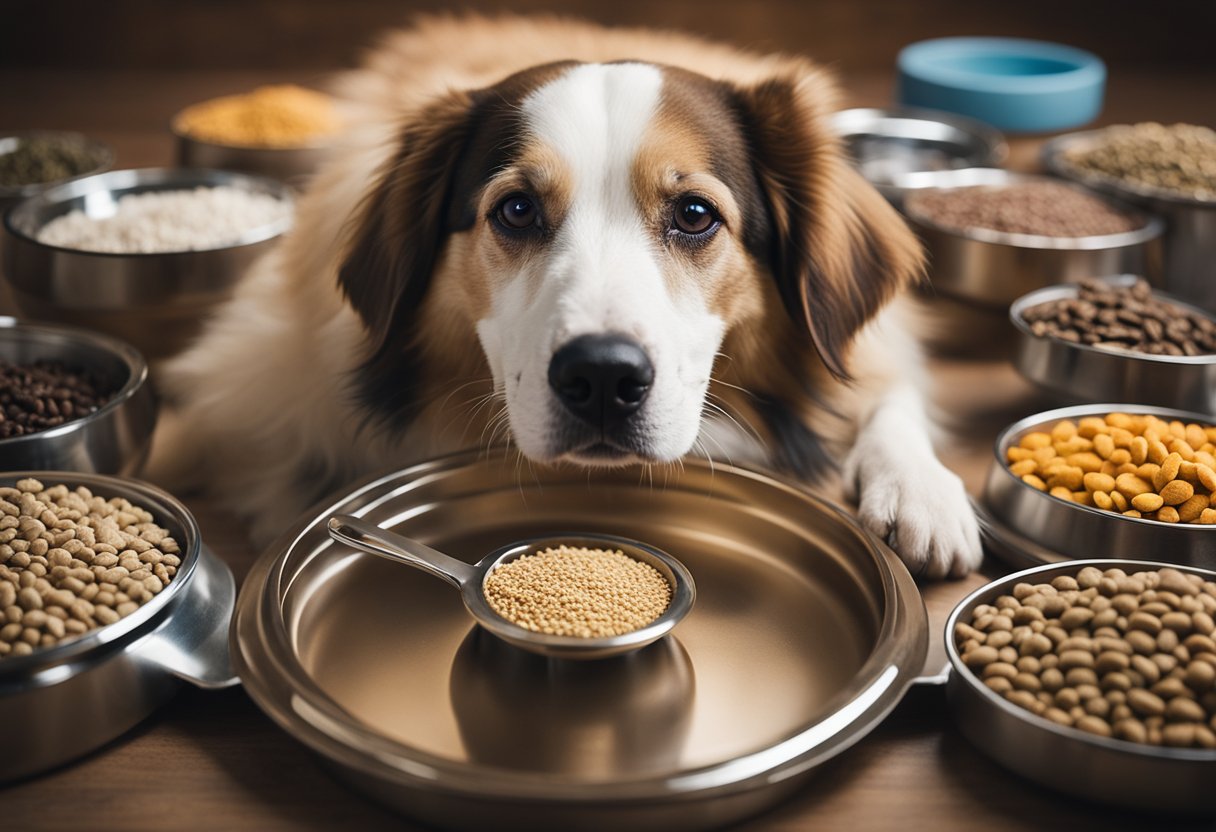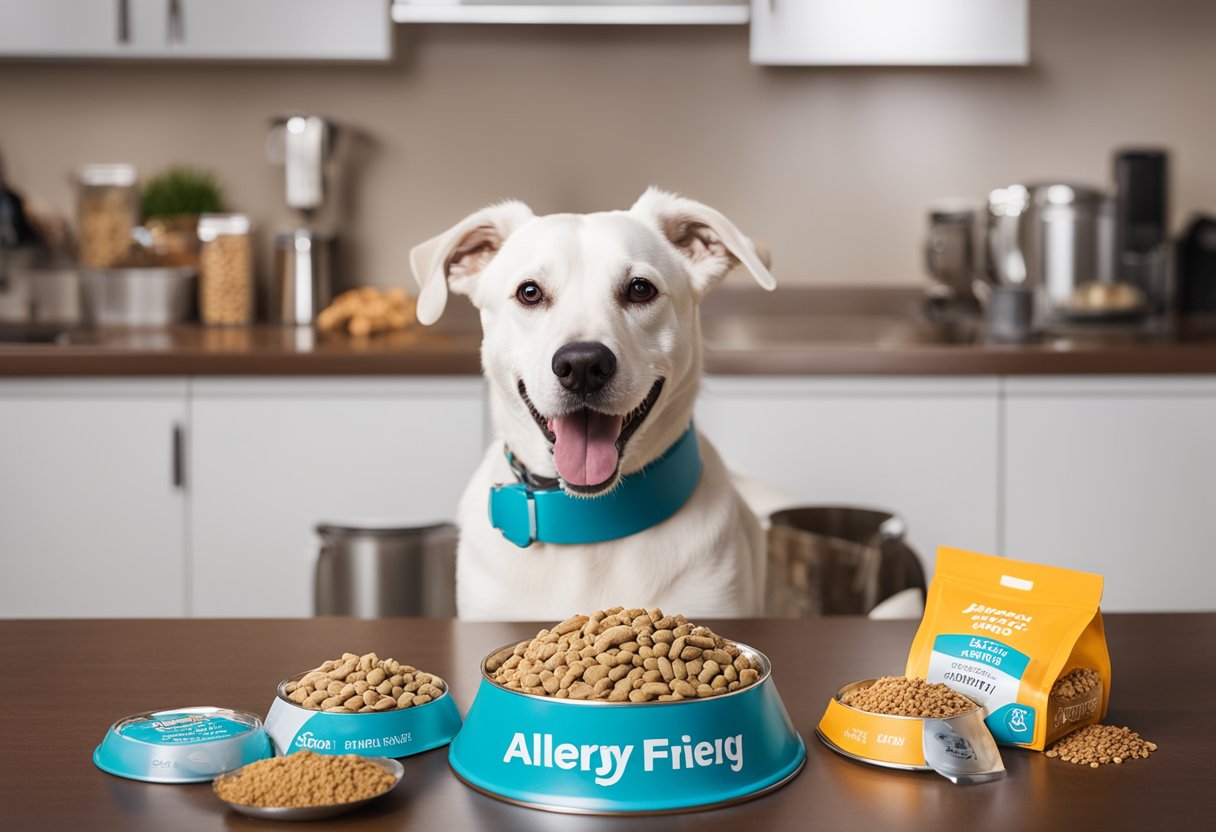Best Dog Food for Allergies: Top Picks for Sensitive Pups
If your dog is constantly scratching, has skin irritations, or gastrointestinal issues, they may have a food allergy. Allergies in dogs can be caused by a variety of factors such as certain types of protein, grains, or other ingredients. The best way to manage your dog’s allergies is by choosing the right dog food. In this article, we will discuss the best dog food for allergies and how to choose the right one for your furry friend.

Understanding Dog Food Allergies Before we dive into the best dog food for allergies, it’s important to understand what causes food allergies in dogs. Food allergies in dogs are caused by an overactive immune system that reacts negatively to certain ingredients in their food. The most common allergens in dog food are beef, chicken, dairy, wheat, soy, and corn. However, dogs can be allergic to any ingredient in their food, so it’s important to monitor their reactions to different types of food.
Choosing the Right Dog Food for Allergies When choosing the right dog food for allergies, it’s important to look for a hypoallergenic dog food that is free of common allergens. Limited ingredient dog food is also a good option as it contains a limited number of ingredients, making it easier to identify what ingredient is causing the allergy. Grain-free dog food is also a popular option, as grains can be a common allergen in dog food. It’s important to consult with your veterinarian before switching your dog’s diet to ensure that the new food meets their nutritional needs.
Key Takeaways
- Food allergies in dogs can cause skin irritations, gastrointestinal issues, and other health problems.
- Common allergens in dog food include beef, chicken, dairy, wheat, soy, and corn.
- When choosing the right dog food for allergies, look for hypoallergenic, limited ingredient, or grain-free options and consult with your veterinarian.
Understanding Dog Food Allergies

If your dog is constantly scratching, licking, or biting themselves, it could be a sign of food allergies. Food allergies in dogs are relatively common and can cause a range of symptoms, from mild itching to more severe reactions like vomiting and diarrhea. In this section, we’ll discuss the common allergens in dog food, the symptoms of food allergies in dogs, and how to diagnose food allergies.
Common Allergens in Dog Food
Dogs can be allergic to a variety of ingredients commonly found in dog food. The most common allergens in dog food include:
- Beef
- Chicken
- Dairy
- Egg
- Fish
- Lamb
- Pork
- Soy
- Wheat
It’s important to note that dogs can develop allergies to any ingredient in their food, not just the ones listed above. In some cases, dogs may even be allergic to multiple ingredients.
Symptoms of Food Allergies in Dogs
The symptoms of food allergies in dogs can vary depending on the severity of the allergy. Common symptoms of food allergies in dogs include:
- Itching and scratching
- Red, inflamed skin
- Ear infections
- Vomiting
- Diarrhea
- Excessive gas
- Loss of appetite
- Weight loss
If your dog is experiencing any of these symptoms, it’s important to talk to your veterinarian to rule out other underlying health conditions.
Diagnosing Food Allergies
Diagnosing food allergies in dogs can be tricky. Your veterinarian may recommend a food trial, which involves feeding your dog a hypoallergenic diet for a set period of time to see if their symptoms improve. If your dog’s symptoms improve on the hypoallergenic diet, your veterinarian may recommend slowly reintroducing different ingredients to determine which ones are causing the allergic reaction.
In some cases, your veterinarian may recommend blood or skin testing to determine which ingredients your dog is allergic to. However, these tests can be expensive and may not always provide accurate results.
Overall, if you suspect your dog has a food allergy, it’s important to work with your veterinarian to determine the underlying cause of your dog’s symptoms and develop a treatment plan that works best for your dog.
Choosing the Right Dog Food for Allergies

If your dog is suffering from allergies, the right diet can make all the difference. But with so many dog food options on the market, it can be difficult to know where to start. In this section, we’ll go over some key factors to consider when choosing the best dog food for allergies.
Hypoallergenic Dog Food Options
One option to consider is hypoallergenic dog food. These types of foods are designed to be less likely to cause allergic reactions in dogs. Some popular hypoallergenic dog food brands include Blue Buffalo Basics, Hill’s Science Diet, and Royal Canin Veterinary Diet.
Key Ingredients to Look For
When choosing a dog food for allergies, it’s important to look for specific ingredients that are known to be less likely to cause allergic reactions. Some of these ingredients include:
- Lamb
- Venison
- Duck
- Salmon
- Sweet potato
- Peas
- Brown rice
It’s also important to avoid ingredients that are commonly associated with allergies, such as wheat, soy, and corn.
Reading Dog Food Labels
When choosing a dog food for allergies, it’s important to carefully read the label to understand what ingredients are included. Look for foods that are labeled as “limited ingredient” or “single source protein,” as these are often good options for dogs with allergies.
It’s also important to pay attention to the order of the ingredients listed on the label. Ingredients are listed in order of weight, so the first ingredient listed is the one that makes up the majority of the food. Look for foods where the first ingredient is a high-quality protein source, such as lamb or salmon.
By considering these factors and doing your research, you can choose the best dog food for your furry friend’s allergies and keep them healthy and happy.
Resources

When it comes to finding the best dog food for allergies, it can be overwhelming to sift through all the information out there. Luckily, there are some great resources available to help you make an informed decision.
Veterinary Nutritionists
One of the best resources for finding the right dog food for your pet’s allergies is a veterinary nutritionist. These professionals have specialized training in animal nutrition and can work with you to develop a customized diet plan for your dog. They can also recommend specific brands and formulas that are appropriate for dogs with allergies.
Online Reviews
Another useful resource for finding the best dog food for allergies is online reviews. There are many websites and forums where pet owners share their experiences with different dog food brands and formulas. These reviews can provide valuable insights into the quality and effectiveness of various products.
Dog Food Advisor
Dog Food Advisor is a website that provides independent reviews and ratings of dog food brands and formulas. They evaluate each product based on ingredients, nutritional value, and other factors to help pet owners make informed decisions. Their website also includes helpful articles and guides on topics related to dog nutrition and health.
Allergy Testing
If you suspect that your dog has allergies, it may be helpful to have them tested by a veterinarian. Allergy testing can help identify the specific allergens that are causing your dog’s symptoms, which can then be avoided in their diet. Your veterinarian can also recommend specific dog food brands and formulas that are appropriate for dogs with allergies.
By utilizing these resources, you can find the best dog food for your pet’s allergies and help them live a healthy, happy life.
Conclusion

Choosing the right dog food for allergies can be a daunting task, but it is crucial to ensure the health and well-being of your furry friend. By following the tips and recommendations outlined in this article, you can make an informed decision about the best dog food for your dog’s allergies.
Remember to always consult with your veterinarian before making any changes to your dog’s diet, especially if your dog has a pre-existing medical condition. Keep in mind that there is no one-size-fits-all solution, and what works for one dog may not work for another.
When selecting a dog food for allergies, look for high-quality ingredients that are free from common allergens such as grains, soy, and corn. Consider trying a limited ingredient diet or a hydrolyzed protein diet, both of which may be beneficial for dogs with allergies.
Finally, pay attention to your dog’s behavior and health after switching to a new dog food. If you notice any adverse reactions, such as vomiting, diarrhea, or skin irritations, stop feeding the food immediately and consult with your veterinarian.
By taking the time to research and select the best dog food for allergies, you can help your dog live a happy, healthy, and allergy-free life.
Frequently Asked Questions

What ingredients should I look for in dog food to manage allergies?
When selecting dog food for allergies, it’s important to look for limited ingredient diets that contain novel protein sources like duck, venison, or salmon. Foods that contain a single source of protein and carbohydrate are also a good choice. Avoid foods that contain common allergens like chicken, beef, dairy, or corn.
How can I tell if my dog has food allergies?
Food allergies in dogs can cause a variety of symptoms, including itching, redness, and inflammation of the skin, ear infections, vomiting, diarrhea, and gas. If your dog exhibits any of these symptoms, it’s important to consult with your veterinarian to determine if food allergies are the cause.
What are the benefits of hypoallergenic dog food for allergic dogs?
Hypoallergenic dog food is specially formulated to reduce the risk of allergic reactions in dogs. These foods typically contain novel protein sources and limited ingredients, which can help reduce the likelihood of allergic reactions. Hypoallergenic dog food can also help improve skin and coat health and reduce digestive issues.
Are grain-free dog foods better for dogs with allergies?
While grain-free dog foods have become popular in recent years, there is no evidence to suggest that they are better for dogs with allergies. In fact, some grain-free dog foods may contain other ingredients that can cause allergic reactions in dogs, such as peas or lentils. Always consult with your veterinarian before switching your dog to a grain-free diet.
Can homemade diets help dogs with skin allergies, and what recipes are recommended?
Homemade diets can be beneficial for dogs with skin allergies, as they allow you to control the ingredients that your dog is consuming. However, it’s important to consult with your veterinarian or a veterinary nutritionist to ensure that your homemade diet is nutritionally balanced and meets your dog’s specific needs. Some recommended recipes for dogs with skin allergies include a fish and sweet potato recipe or a turkey and quinoa recipe.
What is the role of omega-3 fatty acids in managing dogs with skin allergies?
Omega-3 fatty acids can be beneficial for dogs with skin allergies, as they have anti-inflammatory properties that can help reduce itching and inflammation. Omega-3 fatty acids can be found in fish oil supplements or in foods like salmon, sardines, and flaxseed. Always consult with your veterinarian before adding supplements to your dog’s diet.
